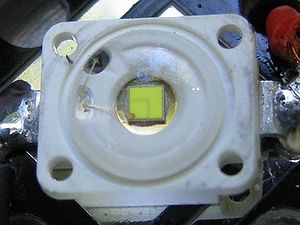Osram: Difference between revisions
(typo) |
(try to improve explanation of tint bins) |
||
| Line 19: | Line 19: | ||
|} | |} | ||
There are tint families for warm white (LCW), white (LW), and ultrawhite (LUW) which is a cool white. The warm white and ultra white families sometimes seem to follow [[ANSI White]] with each ANSI White quadrangle broken up into a number of subgrids (it doesn't seem to be their intention to be able to bin by individual subgrids but by groups). The grid has numbers which are vertical subdivisions and letters which are horizontal (they follow the color temperatures) as follows: | There are tint families for warm white (LCW), white (LW), and ultrawhite (LUW) which is a cool white. The warm white and ultra white families sometimes seem to follow [[ANSI White]] with each ANSI White quadrangle broken up into a number of subgrids (it doesn't seem to be their intention to be able to bin by individual subgrids but by groups). The grid has numbers which are vertical subdivisions and letters which are horizontal (they follow the color temperatures; for instance, 6500K is divided into vertical bands C,D, and E while 5700K is divided into F and G) as follows: | ||
{|class="wikitable" style="text-align: center; width: 400px;" | {|class="wikitable" style="text-align: center; width: 400px;" | ||
Revision as of 09:56, 3 September 2011

Osram is a German company owned by Siemens. Their subsidiary that produces LED's is called Osram Opto Semiconductors GmbH. Osram is known for the Golden Dragon series of LED's and the OSTAR multiple-die LED's. The Golden Dragon Plus LED (similar to Cree XR-E Q5) was used in several NiteCore flashlight models. The Golden Dragon Plus is denoted by the code W5AM.
| Bin | 350mA 100% |
700mA 170% |
1000mA 220% |
|---|---|---|---|
| JZ | 61-71 | 104-121 | 134-156 |
| KX | 71-82 | 121-139 | 156-180 |
| KY | 82-97 | 139-165 | 180-213 |
| KZ | 97-112 | 165-190 | 213-246 |
| LX | 112-130 | 190-221 | 246-286 |
| LY* | 130-150 | 221-255 | 286-330 |
There are tint families for warm white (LCW), white (LW), and ultrawhite (LUW) which is a cool white. The warm white and ultra white families sometimes seem to follow ANSI White with each ANSI White quadrangle broken up into a number of subgrids (it doesn't seem to be their intention to be able to bin by individual subgrids but by groups). The grid has numbers which are vertical subdivisions and letters which are horizontal (they follow the color temperatures; for instance, 6500K is divided into vertical bands C,D, and E while 5700K is divided into F and G) as follows:
| Bins | Subgrids | Temperature | Family |
|---|---|---|---|
| 4C-8E | 15 | 6500K | Ultra white |
| 5F-8G | 8 | 5700K | Ultra white |
| 4J-8K | 10 | 4500K | Warm white |
| 4L-8N | 15 | 4000K | Warm white |
| 4O-9Q | 18 | 3500K | Warm white |
| 4R-9T | 18 | 3000K | Warm white |
| 4U-9X | 24 | 2700K | Warm white |